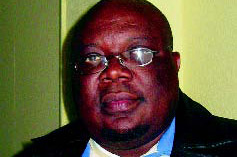AMID THE surreal village that is the Mosney asylum seeker complex is Claude Mashinda Ilunga.
A well-spoken and courteous man, Ilunga says he fled his native DR Congo in 2004, claiming serious danger on account of oppositional and journalistic activities.
He is among around 20 Congolese nationals based at the Co Meath asylum seeker centre, which accommodates asylum applicants while their claims are processed. They are forbidden from legally working during this process.
Around one year after his arrival in September 2004, Ilunga was issued a refusal to his asylum claim. His subsequent appeal to the controversial Refugee Appeals Tribunal was also dismissed.
Ilunga admits that before coming to Ireland, he had sought sanctuary in Accra, Ghana but claims he didn’t feel safe there.
“Africa is and remains Africa. Wherever you are in Africa, if you are under threat from a corner of the continent you will be threatened all over the continent. It happens all the time, and it wasn’t safe for me, that’s it.”
According to the Congolese man, who awaits a decision on his applications for leave to remain and subsidiary protection, family and friends back home report that his deeply troubled central African birthland is continuing on a downward spiral of chaos and violence.
DR Congo experienced a brutal war from 1998 to 2003, which saw government forces (backed by Angola, Namibia and Zimbabwe) take on rebels supported by Rwanda and Uganda.
At least three million people are believed to have died in the conflict, and profound problems remain, with the International Rescue Comm-ittee, an American aid organisation, recently reporting that an estimated 45,000 people continue to die every month in DR Congo, mainly from hunger and disease.
Moreover, in the country’s east, fresh fighting involving several governments and four militias has displaced hundreds of thousands, with widespread reports of murder, rape and looting.
Back in Mosney, Ilunga claims he’s been a target for much of his life, being both a journalist and oppositionalist.
In Kinshasa, he says, he wrote for the Umoja, La Potential and Le Phare newspapers. “I was mainly a ghost writer, like not under my name – using an alias, because of the kind of topics I was writing about – the political situation, economic mayhem, the corruption – so it was unsafe to write about my own identity,” he says.
However, he claims that knowledge of his journalistic activities and his membership of the country’s leading opposition movement made him a target. In DR Congo, he continues, oppositionalists, journalists and others who do not comply with the official line face serious dangers, including murder.
“All you know about law, about security, about the work of the police, forget about it,” he says. “It’s only two extremes – the very weak and poor, and the very wealthy and powerful - that’s the way it is, that’s the way it works.”
He continues: “I know almost all the detention places in Kinshasa because I’ve been there. When they arrest you, they tell you why you are arrested. They say ‘Look, you are an enemy of the revolution’ – they call it like that. ‘You are an enemy of the progress’ – they call the regime progress. Or ‘You are an enemy of the democracy’. The country is called the Democratic Republic of Congo, that says it all.”
In November, Human Rights Watch issued a report which claimed that state security forces in DR Congo have killed an estimated 500 people and detained a further 1,000 – many suffering torture – in the two years since the elections that were meant to bring democracy to the country.
According to the organisation, the “brutal repression” against perceived opponents began during the 2006 elections that elevated President Joseph Kabila to power, and has continued to this day.
Ilunga says his country’s massive wealth in mineral resources is a pivotal reason why DR Congo will not be experiencing peace any time soon. “There are so many interests colliding,” he says. “That’s the way it is.”
98% of DR Congo applicants refused by refugee tribunal
SOME 98 per cent of failed asylum seekers from DR Congo had their appeals rejected by the controversial Refugee Appeals Tribunal (RAT) during 2008.
The much-criticised tribunal, which assesses claimants rejected by the Office of the Refugee Applications Commissioner (which itself has a high refusal rate), increased its percentage of refusals of DR Congo applicants by approximately 12 per cent on 2007.
In total, 833 Congolese nationals have been given refugee status on appeal since 2004. The overall rate of rejection during this period, however, has averaged at nearly 90 per cent.
In December, the High Court ruled as unsafe a decision by the RAT in rejecting an application from a Congolese man who claimed he faced political persecution back home.
The teacher, who was active in a school strike in early 2005, succeeded in judicial review proceedings challenging a RAT decision rejecting as implausible his claims that he faced persecution due to his activism against the government of DR Congo.
The incoming Immigration, Residence and Protection Bill will replace the existing tribunal – considered a cash cow for the solicitors and barristers that man it part-time – with a new body called the Protection Review Tribunal.
Congolese in Ireland are thought to number around 3,000, although not all are in the asylum process. According to Justin Pambi of Congolese Community Ireland, there is also growing disquiet among his countrymen and women over the high rate of failed ‘leave to remain’ and ‘subsidiary protection’ decisions being issued.
However, the number of effected deportations of Congolese in recent years has remained low. According to the Department of Justice, since 2004 to date, fewer than 10 Congolese nationals have been deported from Ireland.












